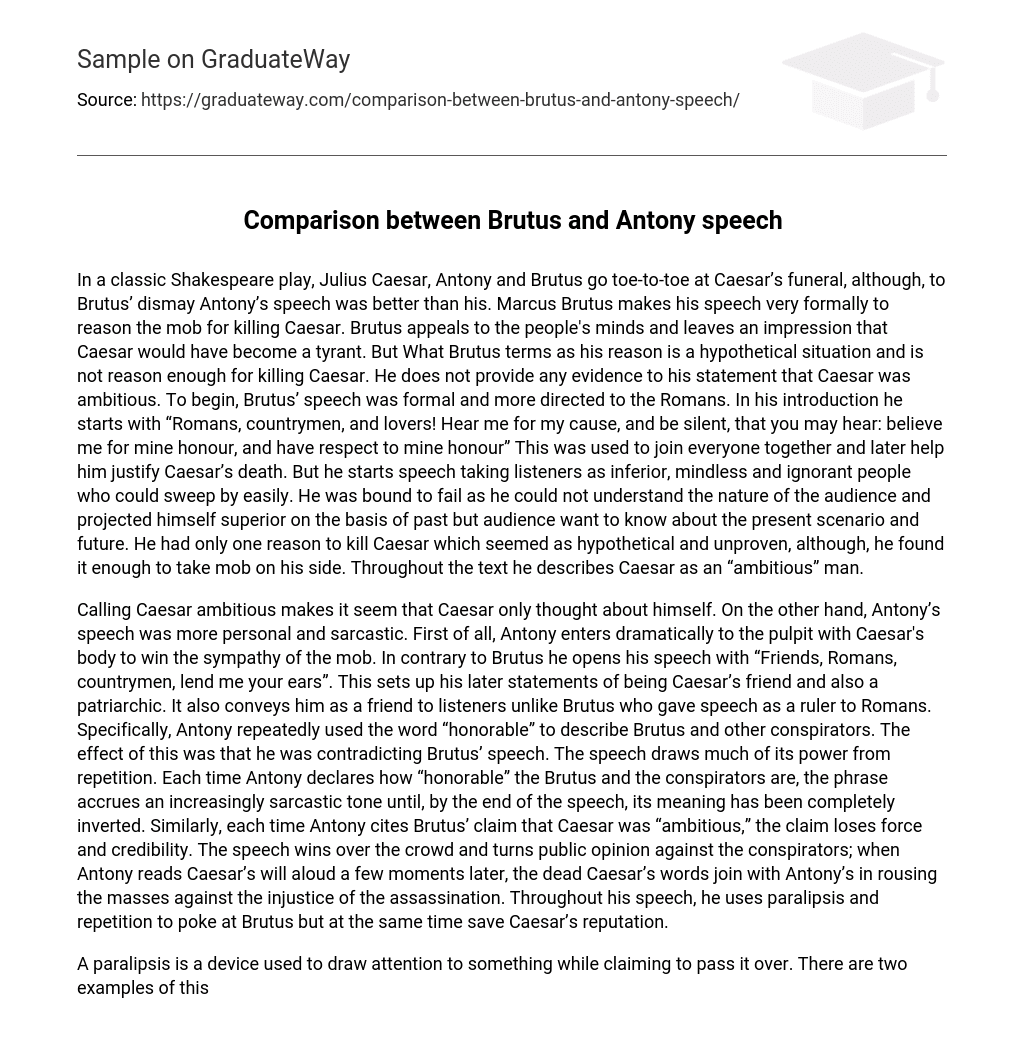In a classic Shakespeare play, Julius Caesar, Antony and Brutus go toe-to-toe at Caesar’s funeral, although, to Brutus’ dismay Antony’s speech was better than his. Marcus Brutus makes his speech very formally to reason the mob for killing Caesar. Brutus appeals to the people’s minds and leaves an impression that Caesar would have become a tyrant. But What Brutus terms as his reason is a hypothetical situation and is not reason enough for killing Caesar. He does not provide any evidence to his statement that Caesar was ambitious. To begin, Brutus’ speech was formal and more directed to the Romans. In his introduction he starts with “Romans, countrymen, and lovers! Hear me for my cause, and be silent, that you may hear: believe me for mine honour, and have respect to mine honour” This was used to join everyone together and later help him justify Caesar’s death. But he starts speech taking listeners as inferior, mindless and ignorant people who could sweep by easily. He was bound to fail as he could not understand the nature of the audience and projected himself superior on the basis of past but audience want to know about the present scenario and future. He had only one reason to kill Caesar which seemed as hypothetical and unproven, although, he found it enough to take mob on his side. Throughout the text he describes Caesar as an “ambitious” man.
Calling Caesar ambitious makes it seem that Caesar only thought about himself. On the other hand, Antony’s speech was more personal and sarcastic. First of all, Antony enters dramatically to the pulpit with Caesar’s body to win the sympathy of the mob. In contrary to Brutus he opens his speech with “Friends, Romans, countrymen, lend me your ears”. This sets up his later statements of being Caesar’s friend and also a patriarchic. It also conveys him as a friend to listeners unlike Brutus who gave speech as a ruler to Romans. Specifically, Antony repeatedly used the word “honorable” to describe Brutus and other conspirators. The effect of this was that he was contradicting Brutus’ speech. The speech draws much of its power from repetition. Each time Antony declares how “honorable” the Brutus and the conspirators are, the phrase accrues an increasingly sarcastic tone until, by the end of the speech, its meaning has been completely inverted. Similarly, each time Antony cites Brutus’ claim that Caesar was “ambitious,” the claim loses force and credibility. The speech wins over the crowd and turns public opinion against the conspirators; when Antony reads Caesar’s will aloud a few moments later, the dead Caesar’s words join with Antony’s in rousing the masses against the injustice of the assassination. Throughout his speech, he uses paralipsis and repetition to poke at Brutus but at the same time save Caesar’s reputation.
A paralipsis is a device used to draw attention to something while claiming to pass it over. There are two examples of this one is “I come to bury Caesar, not to praise him.” But throughout the speech he praises Caesar and what he has done. Another example is “I speak not to disprove what Brutus spoke, But here I am to speak what I do know.”, although he talks good about Caesar and what he has done for Rome, in contrary to what Brutus said. While comparing the two speeches I have found that Antony’s speech was more persuasive. He made points to contrast what Brutus said in his speech about Caesar.
He says that Brutus was wrong twistly and he put a new spin on it. For instance, Brutus says “Had you rather Caesar was living and die all slaves, than that Caesar were dead, to live all free men?” which was countered by Antony in statement “he hath brought many captives home to Rome, whose ransoms did the general coffers fill; did this in Caesar seem ambitious?, when that the poor have cried, Caesar hath wept: ambition should be made of sterner stuff: yet Brutus says he was ambitious; and Brutus is an honorable man”. Antony countered Brutus by saying that Caesar felt deeply for his people and that he was a very humble kindhearted person, that he brings money and gave it to the coffers without any greed. He also gave mob the fact that Caesar refused the kingly crown thrice which directly contradicts Brutus’ statement that he turned tyrant. Throughout Antony’s speech he uses devices, tactics, and his sympathy to his advantage.
Antony is gifted with the power of oratory that helped him to stir the common man. Antony proves himself everywhere Brutus was weak. With caution and gradual persuasion, he proves that he is a consummate politician using gestures and skilled rhetoric to his advantage. Brutus only had one point, which was that he killed Caesar for Rome, to stand on. The mob finds it easier to accept Antony, an emotional and sincere speaker than Brutus who appears arrogant and forceful. All in all, Antony’s speech was better and more persuasive than Brutus’s.





